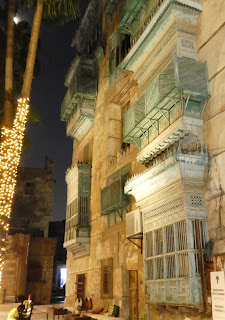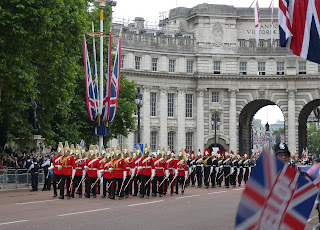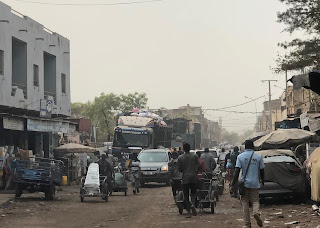Saudi Arabia opened its doors to tourists a couple of years ago, and I was quick to sign up to a tour. Then it was postponed because of the pandemic but finally, a year later than planned, I was in Saudi Arabia - for a ten-day organised tour, followed by four free days.
I don't really know where to start with this post, to be honest, as it was such an enjoyable and fascinating visit in so many different ways, in particular for the scenery (I love deserts), the visual reminders of the history (Nabatean tombs, such as those at Jabal AlAhmar in the pic above, as well as architectural reminders of the Ottoman period, and the Yemeni-style old buildings in the mountains of the south), the camels, and finally the window onto a country undergoing MASSIVE change. This latter was apparent physically (the construction - roads, railways, metros and buildings) as well as socially (women driving, women not fully covered, a few couples holidng hands in public, a public live music performance...). The Crown Prince recognises that the oil era will end, so the money they currently have is being spent on adding/upgrading infrastructure (also financed by the fairly recent introduction of income tax, currently at 15%), whilst an enormous effort is being made to attract visitors, presumably with tourism seen as an important future revenue stream. The social revolution in the 'freeing' of women supports the latter, as does a focus on international events. Just before I arrived in the country there was a Grand Prix held in the streets of Jeddah, as I left there was an international film and arts festival taking place there, as well as a 'rave festival' near Riyadh. Yes, really - men and women dancing to electronic dance music and, according to a report I heard, clear evidence of both alcohol and drugs there (although both of those currently remain illegal). A Saudi there told me that most Saudis he knows would put up with a hundred Khashoggis if it means they will be able to go and have a drink in a bar. Obviously I'm not supporting the murder of journalists - nor any kind of suppression of protest, as is the norm still in Saudi - but the Crown Prince and the change he is trying to bring about is popular - and the extent of change is impressive.
Of course there must be a proportion of the population who were happy with the conservative lifestyle they are used to, and still most women are fully covered, for example - with the niqab as well as the abaya even though the niqab was never obligatory. It was interesting though to experience the extent of the welcome we experienced as tourists, with complete strangers waving to us as they drove past, inviting us into their home for coffee and dates, and countless women beaming with happiness when I smiled at them, making the heart symbol at me with their hands given their inability to express what they were feeling in words.

Anyway - perhaps I should mention some of the more 'standard' tourist highlights that I enjoyed there ... so first of all, the camels! We went to Buraydah camel market - the largest in the world - to observe the trading as well as being real tourists with the opportunity some of us took to feed one man's camels. I have no idea how many camels are there on a typical day, but there were baby and adult camels, there were white, sandy-coloured and dark brown camels, and a small number of smartly attired camels. There were also plenty of trucks with cranes and winches, with protesting camels being lifted up into the air and into the trucks of buyers.
The beautiful desert 'countryside' was also well stocked with camels - some seemingly wild, but all, apparently, with their (mostly Sudanese) camel herder somewhere around.
Then, as I mentioned above, there were the Nabatean tombs, some 130 of them, carved into the sandstone mountains of the desert around the site of AlUla, aka Hegra. These are the same people who carved the monuments of Petra, in Jordan, and the tombs - and their settings - are spectacular and now UNESCO-listed. We stayed for two nghts at the Shaden Resort in the area where the tombs are, with no time available to use the resort swimming pool, nor to request a film to be streamed from Netflix onto the giant outdoor screen ... this pic shows the dining part of the resort, with different cuisines available in the different tented structures.
I should also add that the area is full of old petroglyphs carved into the sandstone rocks.
We visited a few more recent historical sights too - fortresses and 'heritage' towns. The latter were quite amusing, as all contained little heritage museums, showcasing anything 'historical' collected up from that town. The traditional gowns and jewellery, the old daggers, and the traditional furnishing and room set-ups were interesting, but there were also plenty of exhibits of things which date from within my own lifetime, such as manual sewing machines, fixed line telephones, and cans of food!

Then there was Jeddah - beautiful Jeddah, with the Ottoman influence in its architecture - still very much under restoration but already a pleasure to wander around both for the architecture but also for the nightlife (I just wish we'd had the time to stop and enjoy the live music being performed in one little square in the old town). Difficult to photograph given the narrow streets, but this shows the traditional old window screens - there to enable women to observe the street life without being seen. I would have happily spent many days there.
& finally, in terms of major sights seen on the organised tour, there was the city of Medina. Here is found the Masjid an-Nabawi, the big mosque built around the tomb of the Prophet Mohammed, making this the second holiest city in Islam. In the past, such places were off-limits to non-Muslim visitors, but whilst we still cannot go inside the mosque, we are now able to go right up to the courtyard surrounding it.








































